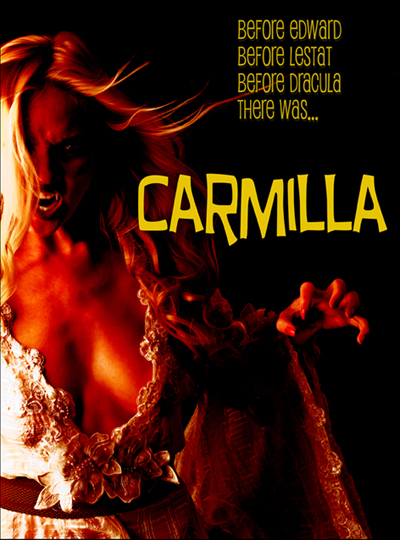Carmilla Theatrical Play Review
Posted on February 2, 2011 by Kenneth Hite

A beautiful young girl, alone in desolate Central Europe. Nightmares. Revenge. Mesmerism. Rationality eroding under the stress of supernatural evil, murder, and disease. Blood. Mere swords against the preternatural strength of the undead. And the world’s first lesbian vampire.
Got your attention? J. Sheridan LeFanu brought these elements together in 1872 — 25 years before Bram Stoker’s Dracula — in his novella “Carmilla”, a story that subtly tilts between the nightmarish Gothic terror-tale and today’s “realistic” horrors set firmly in the waking world. Generations later, Chicago’s Wildclaw Theatre company has adapted “Carmilla” for the modern stage. [Full disclosure: I wrote a short essay, pro bono, on LeFanu for the program book for this production.] Wildclaw’s Carmilla is the latest in a series of adaptations including Machen’s “The Great God Pan,” Lovecraft’s “Dreams in the Witch House,” and William Peter Blatty’s Legion that makes Wildclaw Chicago’s — and perhaps America’s — leading missionary of classic horror to contemporary theater audiences.
In similar fashion, Aly Renee Amidei has adapted LeFanu’s Victorian tale into a modern vampire story. LeFanu’s heroine Laura embodies his themes of isolation, madness, and self-doubt: she is unsure what or whom to believe. Even her own father hides secrets, and she cannot trust her eyes or her heart. Amidei’s Laura (played with just the right notes of poise and hesitancy by Brittany Burch) is less disintegrating soul than battleground: the domestic light (and restrictive prospects) of Victorian society against the forbidden (and horribly murderous) promise of the dangerous Carmilla’s love and life in vampire society. In both versions of the story, Laura is essentially passive; Amidei’s Laura realizes her own powerlessness, and gains tragic depth as a result.
The playwright stacks the deck somewhat against Victorian society, as the vampire-hunting General Spielsdorf reveals in a fearsome acting turn by Brian Amidei: his justifiable rage against Carmilla repeatedly slips into pure and terrifying hatred and misogyny. But Michaela Petro plays Carmilla as a monstrous creature in her own right, who considers her love for Laura almost a weakness. She dominates the stage with her presence, whether gently mocking the laws of Nature, seducing Laura with lies and flattery, or letting her own aristocratic hatred seep through.
This is LeFanu’s Carmilla to the teeth, but in Amidei’s conversion, Carmilla is not alone: the “preternatural conspiracy” of LeFanu’s story is fleshed out into a nest of vampires whose relationships drive and mirror those of their human prey. Not only modern notions of gender/power relations, but modern notions of vampire politics, make Wildclaw’s Carmilla a surprisingly contemporary play for all its Victorian language.
This occasionally prolix Victorian dialogue, and a few subplots introduced by Amidei, slow the pacing in places, but director Scott Cummins wisely eschews any attempt at comic irony (although Laura’s governesses occasionally provide uneven comic relief), letting the story and the situation speak for itself. Overall, the mood slowly lowers, pieces of the story coming together without pressure or posturing through one final flashback establishing the horrifying history of Carmilla and her clan. The climactic horror breaks well and rapidly after that; the ending may or may not surprise close readers of the original novella.
The staging is, as Wildclaw patrons have come to expect, supremely technically competent. Paul Foster and Danielle McKenzie’s lighting design, Alan Donohue’s set, and Aly Renee Amidei’s costumes deserve special marks; the fight scenes (choreographed by director Scott Cummins and fight director David Chrzanowski) take on the heightened, almost artificial look of nightmare as they anchor the play’s central conflict. Charlie Athanas’ special effects range from Gothic fog to flickering strobes to — yes — gouts of blood.
Of all the blood splattered around, however, perhaps none is more quietly terrifying than the blood drained from a passive, nearly somnambulistic Laura to use as bait for Carmilla. Dr. Hesselius (promoted from the novella’s introduction into a Van Helsing role, played with restraint by Steve Herson) and Laura’s father (a crisp, remote figure embodying Victorian society, well embodied by Charley Sherman) make their rational decision to embrace irrationality without bothering to inform or consult the victim — or the audience, achieving genuine shock as we suddenly discover that we, also, are the battleground of the play.
Carmilla runs through February 20 at the Chicago DCA Theater.
Review by Ken Hite

